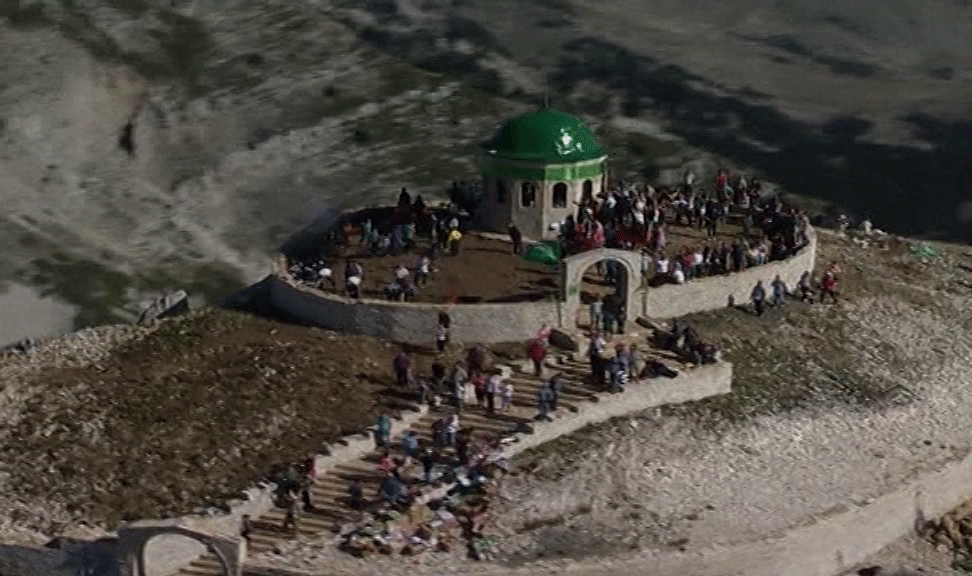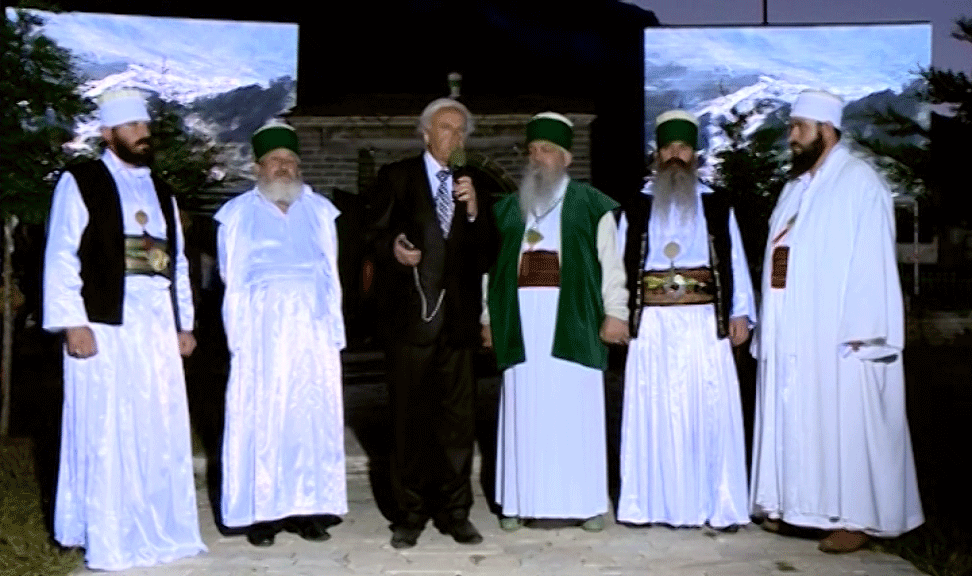

Ferdinand Samarxhi, Great Master.
August 20-25 Great world pilgrimage. Over 500 thousand people come these days from all over the world to Mount Tomorri.
The earliest and most ancient history of the land of Albania revolves around the mythical divine Tomorri, the mountain God, God of all, where the peaks are located, The splendor of the glory and majesty of our genesis. From the depths of the hones, the nebulae of the times you can see far and deep the contours of the world's oldest temple on earth, the Pelasgian Dodona, the Oracle of Zeus.
You have to split the thread of space, to fly like a Deodonian eagle to see that its contours more and more shine on the horizon and radiate the bright history of our genesis. From antiquity, as today, hundreds of thousands of people came to Tomorr from the borders of Northern Illyria further to make sacrifices, for the gods where as our renaissance say Tomorri, Throne and God of all.
Tomorri, like a giant mountain of history, like a newly town, shines with hundreds of glowing lights unquenched by nights and sleepless people throwing their feet into the log of ancient dance, with worship and offerings receive the sanctity of the ancient temple of Dodona, today's Tomorri, the holy place of Abaz Ali.
Tomorri, this ancient temple begins in history under a Mythological We to the depths of centuries where the gaze of scholars. The name of the ancient temple, Dodona Pelasgian, today Tomorri is documented quite early in the dawn of the writing of Homeric poems. Aeschylus, 5th century b.c. in "Bound Prometheus", 800, says "… When you have reached the Land of the Molossians of Upper Dodona there is an Oracle of Jupiter Thesprot…" In book VI, VII he states that the Temple of Dodona is located on top of a mountain high that is today Tomorri.
Name and history of the Tomorri Temple - History of the Pelasgian Dodona
The name and history of the temple of Mount Tomorri is inseparable from the name and history of Dodona, which is the Oracle of Zeus. Homer in the poem "Ilida" says: "O King Zeus, the Pelasgian Dodona who lives far away ruling Dodona (today's Tomorri) who are beaten by severe and wild winters. Here Zeus wanted to build the most valuable Shrine for mankind, His Oracle Dodona Pelasgian ".
The old historian P. Aravantioit, in his book published in Ioannina in 1859 states: “Dodona was a pre-Hellenic Pelasgian center, much older than the Greek language, gods and mythology, as such, it was known throughout the world. ancient and this existing reality has been acknowledged by the most ancient Hellenic authors themselves ”. Dodona was built in an early era, in the mythological era.
Herodotus underlines a special detail of great scientific interest for our genesis. … Dodona was built by the local inhabitants of Epirus, from the oldest, the Pelasgians, the Arcadians and the Tirrets. Herodotus, who visited this temple, when talking about the prophecies of Dodona, the temple priestesses in his book says: “Dodona its shrine, was the oldest of all and the first, the oldest temple on earth ”. And below in his book he continues and shows that they came there to make offerings, dedications (aferoma) and from the peoples of Europe that were located in the north of Illyria. He also writes: "The Pelasgians used to sacrifice everything to the gods, as I learned in Dodona - he says. The Pelasgians… were nothing but a barbarian people… the Mollos and the Pelasgian Arcadians. ”
Hesiod, the seventh book, p.16, mentions as the place of the shrine of Dodona, the city Sella of Sellopia. Hellopia is a place full of fertile fields and full of large herds of sheep, cows, laughs. The first of this country were shepherds, cows, or as it is otherwise called vuvote. In the poem "Carmina", Hesiod not only describes Hellopia, but is also described as the homeland of Dodona.
It's a Hellopia field, Here for the most part. It is revered Dodona.
Hellopia, the plain of Dodona Pelasgian, praised by Hesiod since the century. VIII b.c. The place around Dodona itself was called Hellopia as it was also called Eubea.
Hesiod century VIII-VII b.c. states "Dodona and Lisi were the center of the Pelasgians", that the god Lycaon was the son of the Pelasgians, thus reinforcing Homer's statement centuries ago, that the Pelasgians, the ancestors of our genesis were divine.
Herodotus initially believed that the names of the deities came from Egypt, but searching revealed that they had come from the barbarians. The origin of the religion comes from the barbarians, the Pelasgians and the Illyrian Epirote Saint of Dodona. Zeus therefore the most powerful God of Greek mythology, wanted Dodona to be built on this high peak (Tomorr) and it to be His Oracle.
Sami Frashëri writes that even the most ancient, civilized times of Greece, the famous Temple of Dodona located in Epirus, belonged to the Pelasgians.
The priests who served in the temple and the people in the surrounding area spoke the language of the Pelasgians. And visitors coming from the Greek provinces were obliged to find out more translators. The population of Atamania (Aspropotam, the districts of Xhumreka and Kalarita) was Pelasgian, the ancestor of our genesis. Their spiritual center was the famous temple of Dodona. The priestesses of the shrine of the temple of Dodona, today's Tomorri, were called peleje (pigeons), which looked like birds among the foreigners who come there to ask about their fate near the temple of Dodona. Pelejet did not speak Hellenic but Gugatin as Barbarian. According to the Mythology in the Oracle of Dodona all the people who came from all over the world came to learn about his fate and prediction. The three elders of the Oracle of Dodona, mentioned by Strabo, are associated with the name of the tribe "Graik" - "Women" who were located in Epirus. The word "Women" is local, Pelasgian, Illyrian, Albanian. According to the father of history, Herodotus, the Hellenic religion of Athens originates from the place where Dodona is located, from Arcadia, from the "Elders", ie from the Pelasgians, from Epirus, the genesis of our country that had several Oracles of Zeus, not only in our lands but also in Libya and Egypt there is a famous Dodona some Oracles of Zeus, even outside the Tiri Epiriote. From this hearth the tradition of the holiness of Zeus and that of mythology has spread towards modern Greece and beyond.
Mythological and historical tradition proves that the ancient inhabitants of this country were called Arë, Argë, Arkadhë and then Pelasgë, Likaonë, Dora, Kadmej, Heraklidë, Hylejë and in antiquity Illyrian. In the times of Homeric history the inhabitants of these places were called Pelasgians, in antiquity Epiriot and Illyrian, synonyms of the general ethnic national names of our genesis.
Homer says in the "Iliad": "After the Enians come the Perrebs, who live around the evil Dodona". These two tribes according to Omar were participants in the Trojan War and inhabitants near Dodona Pelasgian.
Strabo teaches us that the Orestes, the inhabitants of Orestiadha (the old province of Berat) lived in the whole district of Tomorri and Berat, and took their name from Orestes, the son of Agamemnon, the commander of the Greek army in the Trojan War.
Stefan Bizantini to better connect the continuity and arrival of genesis claims that Hellopia with which the name of the province is associated is the Mythological Fountain of the name where the temple is located. Hellopi was the son of Ion, the ethnic name of Hellopia, the province around Dodona. Joni is the son of Durrah. Joni is also the son of King Ilir Adria from whence he took the name of the Adriatic Sea. The Ionian Gulf is the bay where Zeus was born, the sea of Cronus and Rea, according to Pierre Grimani, the place where the archangel nymph, the place where the arkaga nymphs migrated, Io followed by Zeus according to Aeschylus and Ovid. The Ionian Sea in deep antiquity also includes the Adriatic Sea.
Dionysus Halicarnassus in his first book says that the Pelasgian was the son of Zeus and Mioba of Foron. Damn that Zeus was born in Arcadia, in the areas of today's Albania, that Foronidha represents Ours, Europe, one of the wives of Zeus, that the name of the nymph is associated with the Ionian Sea. In the second book he claims that Aeneas arrived in Dodona with the most chosen soldiers, to seek the opinion of the god, where they also found those Trojans who had fled with Helen. Aeneas arrived in the land of the Enians, with whom he associates not only the common name but apparently also the origin. Halicarnassus states that most of the Pelasgians went to the Allies, their brothers in Dodona, against whom no one thought of waging war because they were saints. Since the country could not feed them all on the orders of the Oracle of Dodona, they were thrown into Italy, into Ombre, into the river Pad or Spine. Pseudo Skylasi, Tuqididi, Claude Ptolemy, Titus Livy, etc., claim that the "Eleite" ancestors, the Epiriot tribe respectively Ilir, spread to southern Italy. In antiquity there are several Epiriot cities with this name but also the bay of Elatea in Efyra.
In ancient times, somewhere between Gjirokastra and present-day Saranda, there are two cities, Helanon and Helakranon, words whose roots are found helliopia, helloi, selloi, ahello, hellan with "hell" roots, proving that the meat slaughtered in honor of Zeus and Dodona Pelasgian was baked on the spit, as a sacrifice to the gods. This is the origin of the sacrifice that takes place today In Tomorr, the Pelasgian Dodona, from the depths of antiquity of the times that have come and continue to this day. All of Epirus is "helli", "selleis", the place of roasting the roasted meats as a sacrifice and offering to the god.
Temple of Dodona Pelasgian - The holy shrine today of Abaz Ali.
The ancient temple of Dodona is associated with the history and legend of the arrival of the saint of the war of Karbala, Abaz Ali in Tomorr as our great renaissance Naim Frashëri says in the poem "Karbala".
… What is the one who goes past
Flee like the north
with two or three babies in their arms
is Abaz Aliu…
Abaz Ali come to Tomorr
He came near us
Albania does not remain poor
That God loved him.
In the scorching plain of Karbala, when Abaz Ali noticed the dry and watery lips of Imam Husayn's children, he snatched the cup and set out to take the greatest test of his life.
Mythology reminds us that Abaz Ali came to Mount Tomorri, not only to nurture babies, but he was nurtured from this place, I inherited his supernatural powers and from there after five days I go to Olympus and therefore the pilgrimage to Mount Tomorri that from the time of Abaz Ali's arrival in it, according to the legend, it is celebrated from August 20-25, for five days in a row, in remembrance, of the days of his stay and departure.
Hysen Tusiu, the first missionary to spread the handwritten Qur'an, Islam with its symbol the sword, had come to our lands with a bag And taken from the place where the martyrs of Karbala, Imam Hyseni and Abaz Ali, had fallen. Learning that in these lands was found the oldest temple of the Earth, the shrine of Dodona and the Oracle of Zeus, the first and earliest holy place as claimed by Homer, the most divine people, settled and came exactly in this temple, in his highest peak, he buried the bag with earth, thus creating the mecca of Abaz Ali. Since the Bektashis embrace better than anyone the movement of the saying of the Prophet Muhammad that "Without Homeland there is no Religion" and starting from the life of the mythical heroes, whose life was devotion to the gods, they took special care in the service of sanctification of this ancient temple.
Since then the tradition continues to this day without distinction between the beliefs that Bektashism is among the primates of religious harmony and coexistence.
The Sacrifice of the Mountain
Man has always felt the need to turn to God, which he has manifested in various forms and ways through self-correction, the form he has sought to gain the sympathy of God and to deserve his gifts. Sacrifice of people in ancient and primitive religions is a typical expression of superstition that has had horrible inhuman forms. These forms of sacrifice, the Latins call "do ut des" Give to take back. These reports in Islam are unknown. Since man is an imperfect being God throughout history has led to people, His messengers, Prophets, at different times to help man in every direction and in terms of sacrifice by humanizing sacrifice, ennobling the departed from primitive, superstitious, selfish, idolatrous motives to altruistic, human and social religious motives.
The sacrifice is an act of sublime sacrifice, of man's readiness to sacrifice the most precious, dearest gene we possess in the name of the creator, not to shroud the creator but to build the messages of the creator's words for our individual well-being and social. God is complete enough, timeless, spatial, and unaffected by the laws and rules of the existential world. God really does not need anyone in the whole world. The essence of the sacrifice is explained by God Himself in the Qur'anic verse. To Allaah neither the flesh (of the sacrifice) nor their blood reaches, but to Him reaches your Taqwa (piety). This means that the sacrificial animal is a symbolic alternation with what man is to be sacrificed. The best example of this is Hazrat Ibrahim, who as a father agrees to sacrifice his son Ismail, and the example who agrees to sacrifice the most precious thing himself. The case of Ibrahim a.s. and Ismail a.s. It is a unique case in human history and as such it should inspire us in our time when we are losing all value, when man is losing being human.
The awareness that the sacrifice of one part of other creatures for the benefit of another part - is the key to saving a community from the destruction of ethical categories and faith. It is the highest degree that the Qur'an seeks to attain to its human being, the elevation of consciousness and not its degradation. So the sacrifice is a unique symbolic and practical case of demonstrating faith that influences the unification of the social and religious dimension.
In this context, the tradition continues in Tomorr, as in the past when sacrifices were made in sacrifice and dedication to the god, even today this rite continues as a human religious dementia.
